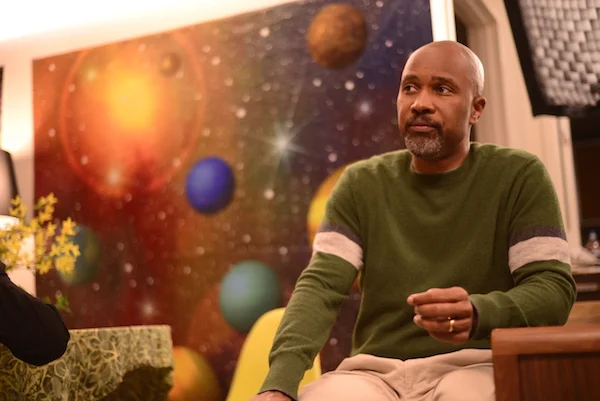Examining History to Understand the Present:
The Story Behind SEND ME
As the George Santayana quote goes, “Those who do not know history's mistakes are doomed to repeat them.” While this statement may very well be true, our histories are very much a part of who we are. We cannot deny who our ancestors were, for all their heartaches, difficulties, and joys directly impacted our families lineage. If you had the opportunity to go back in time to a place that was horrendous for your forefathers, would you go? That’s the very interesting and very complicated question at the center of the web-series Send Me, created and written by Steve Harper.
In Send Me, Harper plays Peter, a comic book store owner who’s wife has a very special talent. Gwen (Tracie Thomas) has the ability to send people back to the time of slavery. The screening process is difficult, not just anyone can go, but even the extensive research on the participants won’t change Peter’s perception that this project needs to stop.
The premise of Send Me is fascinating. Not only is it a story that is outside the normal box of shows, but it also openly addresses an issue that we try to skirt around in daily life. It’s not that we should be proud of the despicable elements of our country’s history, but we also can’t pretend they didn’t happen. At the heart of Send Me, the story isn’t about parading slavery on modern audiences, but trying to see what we can learn from it, and I had the opportunity to learn from Harper about his approach to the series.
“I created SEND ME after spending two years writing for the USA show Covert Affairs. I wanted to create something that felt very close to home. As a Black man, I can be obsessed with race and I started to wonder how I could get an audience to obsess about it, too,” Harper explains. “I combined that with the idea that I’ve always watched TV shows and movies about time travel where the travelers were White. Those characters could always put on a hat or an accent and fit in-–and I knew I could never do that.”
The obsession was not to widen the divide between the races, but instead help seal it through conversation. On the YouTube channel for Send Me, several interviews from potential candidates are available. Each one is different, and each one strikes an emotional cord. The reasons go beyond hateful revenge, and align more with personal growth. This became an interesting exercise for Harper as a writer.
Image provided by MLC PR
“I wanted to lay out diverse perspectives about taking the journey. Everyone asks me, when I explain the premise: “Why would anyone want to do that?” So part of the fun was leaning into that question and facing it head on,” Harper says. “Basically all the people who want to go are interested in the trip in the same way that people in our culture want to climb mountains, jump out of airplanes or do dangerous drugs: they feel they’ll be better on the other side of the experience.”
Web-series in general are short, utilizing the short attention span of our contemporary lifestyles to bring substantial storylines to the front lines. When you have one with a provoking, in more than one way, center, the format becomes more important than normal. Is a subject like race too important to showcase in 3 minute segments? In reality, it’s just the right length to initiate the conversation.
“I suppose that helps with the heaviness of the topic, although, at the heart of it-–this is a show about people who are struggling with each other-–and it happens to be against the backdrop of slavery and time travel. It’s always about the people more than anything else. I think keeping that focus helps with the storytelling,” Harper says.
With all the good that may be coming out of this series, that’s not to say there has been some negative reaction to it. As in all things, critique comes from al corners. However, in this case, most of the negative assessments have come from those who have not seen the show.
“What has surprised me is how often people who haven’t seen the show have been offended by the idea. I’ve heard from several people who’ve said: ‘Why would you create something like that?’ Some people thought I was doing damage to–-I don’t know-–the civil rights struggle or the ancestors,” Harper adds. “I’ve always been clear that this is a piece of entertainment created to get people thinking and talking about race and history in America. So my response has always been: ‘Watch the show-–all of it. Then evaluate it.’”
Image provided by MLC PR
Everything about this show is fascinating to me. From the effortless acting, not just from Harper and Thomas, but also from Gabrielle Carteris (who plays Gwen’s best friend Katherine), Tom DeTrinis (who plays store employee Trevor), and Moe Irvin (who is applicant Phillip); to the way the heavy emotions are handled with care in every episode. The thing that transcends all of it, though, is the possibility for discussion amongst all audiences. The show may be about the time of slavery and sending African-Americans back in time, but that doesn’t mean other ethnicities and cultures cannot relate. That, to me, is a powerful thing.
“As a writer, I like to tackle what I call ‘the invisible things’: the things that people are reluctant to talk about. SEND ME comes out of that tradition. I love the idea that anyone who sees this, regardless of race, can dive into a discussion about the impact of history on their present lives,” Harper adds. “I’m all about the dialogue. If the work can continue to inspire that, it would make me very happy. One of the things I’m excited about is that there are no villains in SEND ME. It’s about people wrestling with where they come from and how they relate to that history. That’s a universal idea.”
Entertainment is meant as an escape from real world problems. It’s an art form where we can stop trying to control everything and let someone else take us for a ride. When there is a show that is not only an escape, but also an indulgence in education, fortune lands with the audience. Send Me is a fascinating web-series in which audiences can begin to tackle the heavy hitting topics in a safe environment.
“To me the key takeaway is that history lives in us. It’s present and relevant NOW–-not just in the history books. What happened to our ancestors is part of the fabric of our lives and recognizing that is part of being an American,” Harper concludes.
The first season of Send Me can be viewed in it's entirety on it's YouTube channel.
Written by Lisa Mejia


